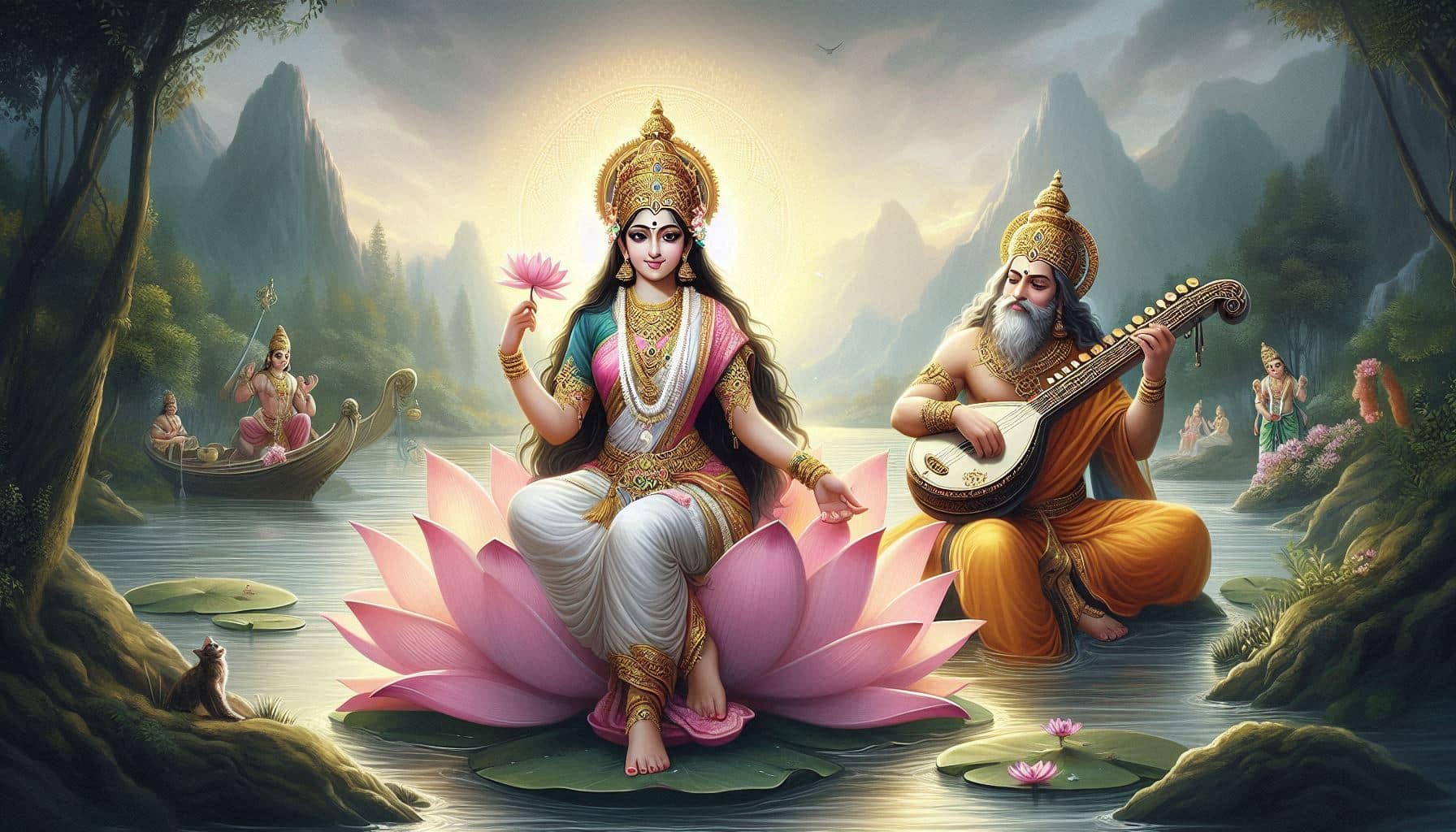
Spirituality
When Maa Saraswati Cursed Brahma
Did you know that the grihastha ashrama, the householder stage, is considered the most crucial one in Hinduism? It’s like the foundation that supports all the other stages of life. Think of it this way: in the ashrama system, each stage helps you grow spiritually. As a student (brahmacharya), you learn and develop your character. Later, as a renunciate (sannyasa), you may let go of worldly possessions and focus solely on spiritual pursuits. But the grihastha stage bridges these experiences.
It’s during this time that you build a family, raise children, and contribute to society. Here’s a fascinating connection: performing yajnas, or fire ceremonies, was an essential part of Sanatana Dharma (eternal law). Interestingly, most yajnas require a crucial element – a couple! Without a husband and wife working together, many yadnyas cannot be completed. This unique role of grihastha makes them the backbone of the social and spiritual order. Our next story delves deeper into this concept, so let’s begin!
According to the Hindu religious text Padma Purana, long ago, a powerful demon named Vajranash was causing great trouble on Earth. His actions were creating havoc, and the people and gods were deeply distressed. To restore peace and balance, Lord Brahma, the creator of the universe, decided to intervene. Brahma Ji used his divine powers and successfully killed the demon Vajranash. As Vajranash fell, flowers dropped from Brahma Ji’s hands and landed in three different places, and miraculously, three beautiful lakes were formed at those spots. These lakes became sacred, and the place was named Pushkar, meaning “lotus” in Sanskrit, symbolizing the flowers that fell from Brahma’s hands.
Recognizing the holiness of this newly formed place, Brahma Ji decided to perform a sacred yagya, a fire ritual, at Pushkar to purify the land and bring blessings. For the final offering, known as Purnahuti, it was necessary for his wife, Goddess Saraswati, to be present. However, Saraswati was not available at that crucial moment. Brahma Ji, determined to complete the yagya, married a girl from the Gurjar community named Gayatri, and with her by his side, he finished the sacred ritual.
Just then, Goddess Saraswati arrived and was furious to see another woman sitting next to Brahma. In her anger and hurt, she cursed Brahma Ji, declaring that despite being a god, he would never be worshiped by people. However, as her anger subsided, she softened the curse, allowing Brahma to be worshiped only in Pushkar. Understanding the gravity of the curse, Lord Vishnu stepped in to help calm Saraswati.
Yet, Saraswati’s anger turned towards Vishnu as well, and she cursed him too. She declared that Vishnu would have to experience the pain of separation from his wife. This curse came to fruition when Vishnu took the human incarnation of Lord Ram. During his earthly life, Ram endured 14 years of exile, during which he was separated from his beloved wife, Sita.
Thus, Pushkar became the only place on Earth where Lord Brahma is worshiped, and it stands as a symbol of divine intervention, sacred rituals, and the profound consequences of divine actions. This story highlights the deep connections between the gods and their influences on the world, reminding us of the power and complexity of divine will and destiny.
Spiritual Takeaways from the Story of Pushkar
Actions Have Consequences
The story shows that every action, whether by gods or humans, has consequences. Brahma Ji’s decision to marry Gayatri to complete the yagya led to Saraswati’s anger and the curses that followed. It reminds us to think carefully about our actions and their potential impact on others.
The Importance of Forgiveness and Compassion
Even though Goddess Saraswati was angry and cursed Brahma and Vishnu, she later softened the curse, allowing Brahma to be worshipped in Pushkar. This teaches us about the importance of forgiveness and compassion. Holding onto anger can cause more harm, but forgiveness can bring peace and resolution.
Accepting Divine Will
Lord Vishnu’s acceptance of his curse and the events that followed show the importance of accepting divine will and destiny. Sometimes, we face challenges that seem unfair, but they are part of a larger plan. Trusting in this plan can help us navigate difficult times with strength and grace.
The Sacredness of Places and Rituals
Pushkar became a sacred place because of the divine events that occurred there. This illustrates how certain places and rituals hold special significance and can be sources of spiritual strength and blessing. It encourages us to respect and honor these sacred traditions.
Balance and Harmony
The yagna performed by Brahma Ji was meant to bring balance and blessings to the land. The story emphasises the importance of seeking harmony in our lives and the world around us. By performing our duties with sincerity and respect, we contribute to the greater good.
Please subscribe to our mailing list to stay connected and receive spiritual information. In case of any queries, please write to us at info@chamundaswamiji.com. You can check out our YouTube channel Chamunda Swamiji where you can learn Tantra, Mantra, Yantra, and Meditation from His Holiness Shri Chamunda Swamiji. If you seek to learn Shakti Kriya, please register with us, and we will get back to you.
Post a Comment
-
Subscribe to Our Blog
-
Categories
-
Popular Articles
- Dead moth in the house. What universe is trying to tell you?
- Spiritual Meaning of Moth
- Vivah Bandhan Curse – What Is It and How to Spiritually Heal It.
- The Dasa Mahavidyas
- What are Beej Mantras?
- Tripura Sundari | The Dasa Mahavidya
- Maa Bhuvaneshwari | The Dasa Mahavidyas
- The Five Shades of Tantra
- Ramakrishna Paramhansa – The Man who almost became a Woman
- Maa Chinnamasta | The Dasa Mahavidyas



